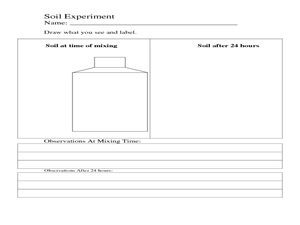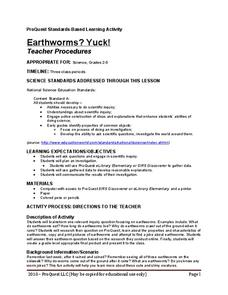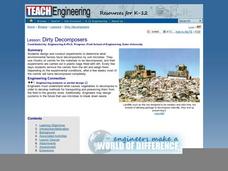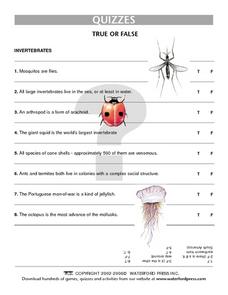Curated OER
"Investigating Soil Color and Texture"
Ninth graders will identify/understand the differences between soil and dirt. They will classify soil color accurately and use Munsell notation to describe it (Munsell books provided).Students will classify soil texture using the feel...
Curated OER
Making a Mini Worm Habitat
Students explore the process of converting organic waste into usable fertilizer. They observe how living and nonliving things interact with one another by making a mini-worm habitat.
Curated OER
Wiggley Worms
Students investigate how worms affect plant growth. In this biology instructional activity, students construct a worm ecosystem in a plastic 2 liter bottle and plant a seed in the soil. They later compare the ecosystems with worms to...
Curated OER
Worm Compost & Vermicomposting
Students explore vermicomposting, the species of worms needed and the proper climate for it. In this composting lesson plan students make their own worm compost bin.
Curated OER
Invertebrate Diversity
Students observe different animals with bilateral symmetry. In this biology lesson, students compare how these animals move. They discuss the evolutionary history of observed animals.
Curated OER
Food Chains
Fourth graders study food chains, producers, consumers, and decomposers. They play a food chain game and create food chain mobiles or posters. They take a nature hike around the school and observe various parts of a food chain.
Curated OER
Animal Behavior
Students investigate stimulus-response behavior, learned behavior in animals and innate behavior in animals. In this animal behavior lesson plan, students answer questions about their reactions to a toy cap gun that is fired off in...
Curated OER
Measuring Up on the Mayflower
Second graders use a meter tape to compare the length of the Mayflower to a basketball court and make homemade butter for crackers. Afterward, all students sit inside the makeshift Mayflower's dimensions and enjoy their Pilgrim butter.
Curated OER
Food Web
Students identify producers and consumers, including scavengers and decomposers, and discuss role each plays in food web. They then make diagram of possible food chain that might include skull pictured on Montana's quarter, and...
Curated OER
Case of the Missing Pumpkin
Students explore the process of decomposition in plants. In this plant biology lesson, students use a cleaned out pumpkin and observe how the decomposition process takes place. Students write down adjectives to describe the pumpkin.
Curated OER
Under Our Feet
Students investigate the forest ecosystem to learn of the living and non-living elements of the soil. In this ecosystem lesson, students examine soil for twigs, moss, fungi, leaves, roots and other matter. Students complete a...
Curated OER
Reptiles and Amphibians
Fourth graders explore biology by viewing animal videos in class. In this amphibian and reptile lesson, 4th graders identify the key differences between reptiles, amphibians and other animal classifications. Students view video clips in...
Curated OER
Dirt: Making Dirty Water Clean!
Fourth graders study soil and water. In this water lesson students work in groups and use a filter to clean water.
Curated OER
Preprimer Word List
In this preprimer word list worksheet, students color the words in the list and draw a line to connect matching words. Students do this for 10 words.
Curated OER
Create a Soil Aggregate
Students simulate the conditions which occur in a soil aggregate. They explain how IPM affects the environment. They identify the cast of characteristics to develop their aggregate.
Curated OER
Is It Alive?
First graders explore living things and their habitats. They create an original It's Alive! book to demonstrate what they have learned.
Curated OER
Centipede or Millipede?
Students discuss millipedes and centipedes in terms of their classification as arthropod. Using a diagram, students categorize and compare and contrast the characteristics of millipedes and centipedes based on their discussion of...
Curated OER
Dirty Decomposers
Seventh graders design and conduct experiments to determine what environmental factors favor decomposition by soil microbes. They use chunks of carrot for the materials to be decomposed, and their experiments are carried out in plastic...
Curated OER
Quiz: Invertebrates
In this science worksheet, 3rd graders will focus on invertebrates. Students will respond to eight true/false questions about these animals.
Curated OER
Cells
In this scientific investigation worksheet, learners follow the provided procedures to examine the number of cells in animals and then respond to 3 short answer questions.
Curated OER
Spatial Characterization of Animal Movement
Students identify biotic and abiotic factors which may alter the observed patterns in plant communities with different structural characteristics, climate, or environmental constraints.
Curated OER
Worms in a Bottle
Students gain a better understanding of the worm and its role in the recycling of organic materials into simpler forms by constructing worm bottles and observing for 60 to 90 days.
Curated OER
Relating Number of Insect Species to Water Quality
Students are asked to respond to questions such as:" Have there been surveys of the area to inventory the species?" (For example, for a wetland area, do they know what amphibians live there and how abundant they are?) Are there any...
Curated OER
The Great Spider Debate
Students study about the survival and hunting strategies of several different kinds of spiders. They also be introduced to scientific classification of spiders and write a brief report about one of the spider families they observe.

























